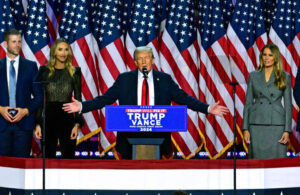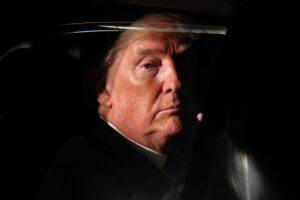The conventional wisdom is that Donald Trump’s election victory is a nightmare for Keir Starmer. Trump not only embodies much that Starmer holds in obvious contempt, but his very presence in the White House captures much of Britain’s essential weakness in 2024. Whatever Labour MPs think of him, the incoming US President has more power to undermine British prosperity — and therefore their own chances of reelection — than anyone else on the planet, including, perhaps, their own leader. Like Cleopatra trying to survive the great imperial power struggles of the late Roman republic, Starmer has little choice but to submit to the new American Caesar and hope for the best.
Despite the inevitable hand wringing in Westminster, however, Trump’s election provides a political opportunity for Starmer that, intriguingly, has not gone unnoticed inside No.10. From a purely partisan perspective, those close to Starmer see Kamala Harris’s crushing defeat not only as a personal rejection, but also as an ideological repudiation of the kind of progressivism she came to represent. In their view, Harris’s brand of “be more woke” liberalism is just as antithetical to the voters Labour needs here as it was to the voters the Democrats needed across the Atlantic.
To understand the tensions at the heart of the Starmer government over its response to Trump’s victory, it is important to distinguish between the historical, organisational and emotional ties between Labour and the Democrats, which sparked Trump’s ire during the presidential campaign, and the divergent political projects taking shape in London and Washington. Those close to Morgan McSweeney, Keir Starmer’s influential chief of staff, simply do not look to San Francisco, Washington or Ottawa for inspiration as Tony Blair might have done in the Nineties. Instead, they look to the solid and rather staid social democracies of northern Europe. To understand Starmerism, in other words, look to Copenhagen not California.
The interesting question at the heart of this Labour government, however, is not so much what McSweeney’s vision of a successful Labour strategy looks like — for that much is clear — but how widely it is shared within the wider Labour movement. Beyond a few figures in No.10, who else shares McSweeney’s instinctive eye-rolling alienation with the obsessions and prejudices of North American liberalism and, somewhere in their soul, saw Harris’s defeat as deserved?
Fundamentally, many in Starmer’s No.10 believe that their “project” to remake the Labour Party, which started in opposition, is only half finished. To complete it, the party needs to develop far less instinctive sympathy with the kind of progressivism Harris represented — and far more sympathy with the ordinary concerns of Middle England. If the Labour Party is to be more than a Biden-style interregnum between periods of conservative rule, they believe, the party needs to be shaken out of its comfort zone on many of the issues which cost Harris in the election, from immigration to the wider “woke” wars dominating the post-mortems now being written about why her campaign failed.
Harris’s defeat, in short, is both a portent of what could happen to the Labour Party at the next election and a tool Starmer can use to stop that from happening, though only if he has the political skill to do so. Put bluntly, while President Trump will test Starmer’s diplomatic skills to the limit, his victory could help persuade a reluctant Labour Party that it needs to do far more to reassure voters that it shares their instincts. That, at least, is the theory.
None of that is to deny that on day-to-day issues, a Trump presidency will present Starmer with endless problems, which could sap energy from his premiership. When the deportations of undocumented migrants begin, Starmer will come under enormous pressure from his own party to condemn them. Imagine the moment it is discovered that a dual British citizen has been rounded up and separated from his children. Like Tony Blair, forced out of office because of his failure to condemn Israel’s war with Hezbollah in 2006, Starmer cannot run too far from the core instincts of the Labour Party. And yet, who knows what ramifications there will be for Starmer should he go to war against Trump on any particular issue.
All this makes Britain’s choice for the next ambassador to Washington vitally important. Right now, Peter Mandelson is being touted for the position. Appointing him would be a show of power from McSweeney — a close ally of Mandelson — putting the Foreign Office in the shade and raising questions about David Lammy’s influence, given his remarks about Trump as a “neo-Nazi sympathising sociopath”. Mandelson is a commercially-minded politician-cum-businessman — a mould well understood in Washington — with an expertise in global trade rules from his time as European Commissioner. It would be some irony, however, if Mandelson’s latest political reincarnation was to negotiate a new trading relationship for Britain that would not have been possible in the EU.
Trump’s victory is clarifying in more ways than one, however, challenging British politics to reveal its hand on a whole raft of issues beyond Brexit, trade and security. When the President-elect moves to reinforce his southern border, in what sense can Britain plausibly claim to hold a different policy given the emphasis Starmer has placed on the creation of a new “Border Force”? As Starmer put it in his conference speech earlier this year: “It is — as point of fact — the policy of this Government to reduce both net migration and our economic dependency upon it.” The difference between Starmer and Trump, then, is not one of ambition, but delivery. Similarly, when Trump moves to ban the surgical transition of trans children, as he has promised, how will a Labour government react given that Health Secretary Wes Streeting has already kept the previous government’s ban on the use of puberty blockers for children?
On more structural questions, Starmer will face a choice all British prime ministers have tried to avoid: does he align Britain with the US in its struggle for global supremacy with China, or try to carve out a European third way? Britain, France and Germany tried this when Trump pulled the plug on the Iranian nuclear deal in his first term, only to find that they were powerless to escape the economic power of the US. When Britain attempted to continue using Huawei to build its 5G network, despite Trump’s warnings, Boris Johnson was forced into line because Trump simply imposed technological sanctions that Britain could not escape. Expect a similar pattern to play out all over again, even on the thorny issue of Ukraine, where Europe is unlikely to be able to make up the shortfall should Trump decide to pull the plug on US support for Kyiv next year.
If anything, Trump is far more powerful today than he was in 2016, and we in Europe are far weaker. Trump won an undisputed electoral mandate, backed by a likely Congressional trifecta and a more radical, coherent and thought-through ideology developed by organisations such as the Heritage Foundation. Europe, in contrast, looks lost and leaderless, weakened by war and geopolitical competition, and no longer comforted by the idea that Trump is just a passing threat. In Germany, the government is broken and likely to be replaced within months, its economic model ruined by the loss of reliable energy from Russia and high-end manufacturing competition from China. In France, Emmanuel Macron is a shadow of the self-appointed Trump whisperer who bestrode the world stage in 2016. And in Britain, Starmer already looks weakened after the struggles of his first 100 days in office.
The question at the heart of all this, then, is whether there will be an emergence of Trumpism here in the UK, much as Thatcherism went hand in hand with Reaganism. The conditions that gave rise to Trump are, if anything, more pronounced here than in the US: with record levels of immigration, years of economic failure and a growing sense that the British state is in some fundamental sense broken beyond repair.
Such a view, ironically, is already shared by many of those inside No.10 who have already come to see the creaking, mice-infested building of No.10 Downing Street as a symbol of Britain’s failed state. There are a number of senior figures close to Starmer who have even concluded that the building is not suitable as the hub of a 21st-century government and needs to be closed down, and turned into a ceremonial museum. The day-to-day running of government, for its part, would be moved to the Treasury, Foreign Office or even the Home Office. The question is not whether this would be a good idea in practice but whether the government can afford the upheaval.
The central irony of Starmer’s project, then, is not simply that it is trying to address many of the same concerns as Trump — from immigration to gender and globalisation — but that it is also beginning to share the same instinct that something has fundamentally broken in “the system” which needs fixing, or, perhaps, “draining”. For Starmer, and those around him, the question is not how to distance themselves from Trump over the next four years, but how to prove to voters that they don’t need to vote for a British version of him to address their concerns here. Biden, Harris, Scholz and Macron have all tried to do the same and failed. It would be a brave man to bet Starmer will be any different. It didn’t end well for Cleopatra either.
Disclaimer
Some of the posts we share are controversial and we do not necessarily agree with them in the whole extend. Sometimes we agree with the content or part of it but we do not agree with the narration or language. Nevertheless we find them somehow interesting, valuable and/or informative or we share them, because we strongly believe in freedom of speech, free press and journalism. We strongly encourage you to have a critical approach to all the content, do your own research and analysis to build your own opinion.
We would be glad to have your feedback.
Source: UnHerd Read the original article here: https://unherd.com/




